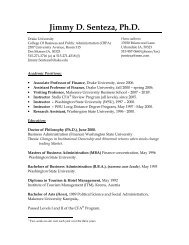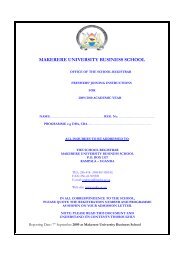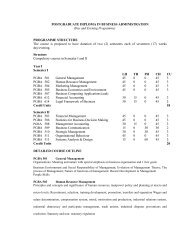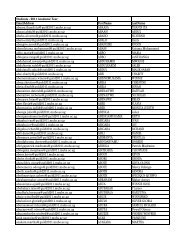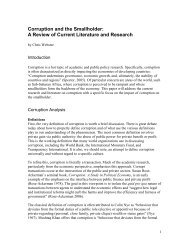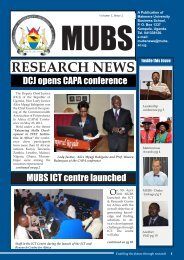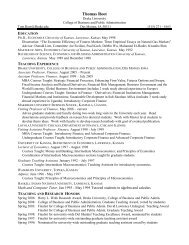13th Annual International Management Conference Proceeding
13th Annual International Management Conference Proceeding
13th Annual International Management Conference Proceeding
Create successful ePaper yourself
Turn your PDF publications into a flip-book with our unique Google optimized e-Paper software.
Boards, for example, enable the firm to create a network without the full costs of true vertical amalgamation. Resourcepoor<br />
entrepreneurial organizations can achieve required strategic benefits by building network exchange structures with<br />
outsiders who are identified as critical resource suppliers. These relationships can stabilize the new firm in its targeted<br />
markets. It is therefore possible to attach value to these networks in the valuation of intellectual capital. While this view<br />
is consistent with the resource dependence perspective, social network theory emphasizes the importance of network<br />
formation on reputation, trust, reciprocity, and mutual interdependence (Larson, 1992). Thus, for example, our earlier<br />
discussion of resource dependence focuses on the role of the board as facilitating the acquisition of resources. In<br />
contrast, social networks theory considers the predictable paths (based on preexisting relationships) that may be used to<br />
acquire these resources.<br />
Therefore, the social network perspective is closely aligned with other theoretical perspectives. This perspective is<br />
distinct, however, in that it focuses on social networks as the primary predictor of board composition. For example,<br />
Forbes and Milliken (1999) pursued the links between group processes and diversity in the study of the literature<br />
focusing on group dynamics and their effects on board effectiveness. They highlighted such areas as board cohesiveness<br />
and effort norms (ensuring preparation, participation and analysis), cognitive conflict (leveraging differences in<br />
perspective), the presence of knowledge and skills, effects of board processes; job related diversity, other aspects of board<br />
demography (proportion of outsiders, board size, board tenure) and board dynamics across different types of boards.<br />
They concluded that board effectiveness was likely to depend heavily on social-psychological processes, particularly<br />
those pertaining to participation and interaction, the exchange of information, and critical discussion. We disagree with<br />
this perspective, however, because it does not explain the other side of the coin of how the board can help in enhancing<br />
the intellectual capital resources of the firm. This is because there is empirical evidence (Nkundabanyanga, 2006) to<br />
show that actually gender diversity on the board enhances intellectual capital performance of firms.<br />
We contend that this is harmonizable by incorporating intellectual capital as a wider set so we could develop a<br />
comprehensive framework for understanding corporate performance. Accordingly, although social networks have been<br />
posited to play an important role in the formation of boards (Birley, 1985; Khurana, 1996), we believe much greater<br />
elaboration of the impact of boards on firm’s intellectual capital is justified since Intellectual capital is generally<br />
becoming widely accepted as a major corporate strategic asset capable of generating sustainable superior firm<br />
performance (Barney, 1991).<br />
Thus, it can be considered that external governance may not be a necessary condition for controlling managers and that<br />
there should exist some other factors that augment, discipline the management, and ensure the efficient operation of the<br />
firm. Outside the standard agency paradigm, some researchers suggest that managers are controlled more or less inside<br />
the firm. Yet others believe that institutional isomorphism explains board behavior and therefore corporate performance.<br />
It is for this varying utility of agency theory, network theory, resource dependency, and institutional theory in predicting<br />
firm performance, we are proposing a comprehensive framework incorporating gender diversity, intellectual capital, and<br />
CEO celebrity.<br />
Theoretical Framework<br />
The following model describes how gender diversity on the board, intellectual capital, governance mechanisms increase<br />
corporate performance. It shows that governance mechanisms can enhance a CEO’s self-efficacy as also the performance<br />
of intellectual capital can enhance the celebrity of CEO’s. We posit that a CEO’s celebrity and his efficacy enhance his<br />
strategic choices in turn enhancing corporate performance. It predicts that a manager’s strategic choices can lead to both<br />
startling performance and spectacular failures of firms because of his celebrity and self-efficacy. Board diversity,<br />
intellectual capital and governance mechanisms shape a firm’s culture and voluntary disclosure proclivity of firms and<br />
this in turn affects corporate performance. The framework shows some demographic factors as being control variables.<br />
Figure 1: Proposed theoretical model<br />
5




